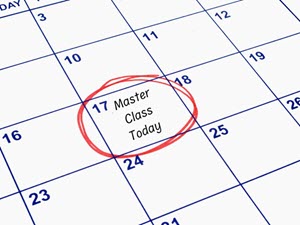FAQ: What are Thinking Lab Master Classes?
What is a master class? A master class is a themed class in which a mentor works with a mentee to help him master a concept or skill, with an audience of other interested students. This format is often used for teaching musicians, speakers, and other performance artists in a group setting. It allows the group to learn from the mentoring of an individual. The less advanced students learn from both the mentor and the more advanced students.

Will there be a handout? Homework? I don’t send out a handout for the master classes, but I do share my brief outline — a list of talking points — in the chat during class and in the podcast show notes. There is always homework for the class listed. Anyone who has the same issue is encouraged to do the homework before the class!
Who can listen to a master class? All current members of the Thinking Lab can attend a master class live. The recordings are then posted to the Thinking Lab Current Classes page and podcast so that all current members can hear them. They stay there for 2-3 months. In some cases, the recordings are added to a self-study course as a bonus recording. Then they are available to future Thinking Lab members, also.
What is the format of the TLab master classes? Master classes are 60-minute sessions divided into three 20-minute sections. In the first part, I (Jean) give an essentialized explanation of the issue, presenting the concepts and principles relevant to it. In the second section, I discuss with the mentee how to apply the theory to his or her particular situation. In the third section, I open the discussion up to other members with similar issues for questions and coaching. (This is not an open Q&A, it is for questions and discussions on the topic of the master class.)
Should everyone do the pre-work? Yes! I encourage all Thinking Labbers to do the pre-work for any class that is interesting to them. We send out the description and pre-work 4-5 days before (usually Friday for a Tuesday class) so that you have time to prepare. Go ahead and send it to me. I promise at least a short response, and if I get it early enough, I may be able to address it in the presentation portion. Regardless, during the last 20 minutes of the class, I encourage others to ask their questions and/or get coaching based on the pre-work. It has been very helpful for mentees to see how the same principles apply to other people’s challenges.
The pre-work is designed to help you move forward from where you are now. Your doing the pre-work will set you up to get the most out of the master class.
How to prepare before class: Past mentees recommend that you:
- Do the pre-work beforehand and send it to Jean 24 hours in advance.
- Read the talking points when they turn up. (I will email them when they are ready, sometime in the late morning or early afternoon on the day of class.)
- Pin my video while we’re talking so that you aren’t particularly aware of the other people listening.
- Be selfish, ask questions, be willing to be a little vulnerable so that you get the best mentoring possible.
- Listen to the other people’s similar situations and see how that clarifies yours.
